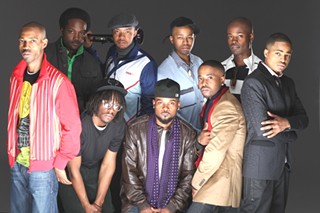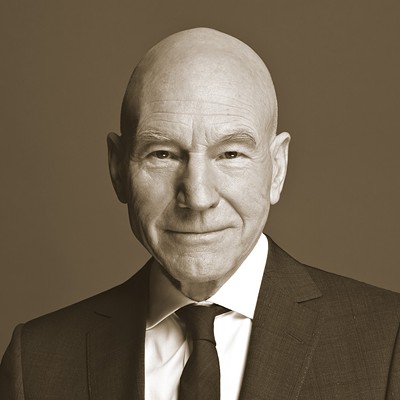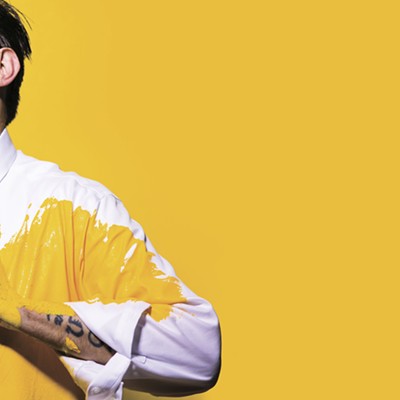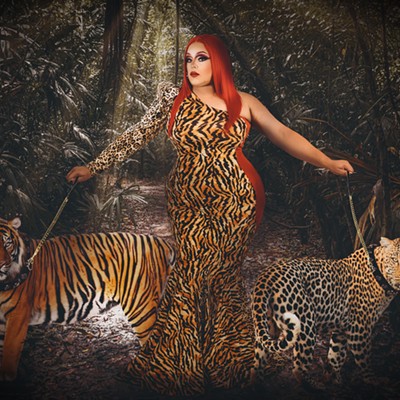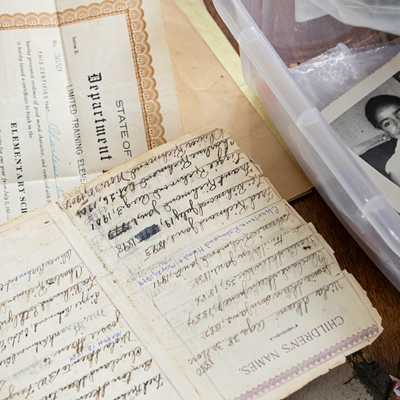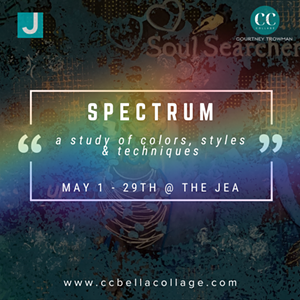The Hypnotic Brass Ensemble is nothing like your run-of-the-mill brass band, as Reuben Atlas' documentary Brothers Hypnotic makes clear.
In this lovingly-crafted film, we are introduced to eight Chicago-bred brothers, all of whom grew up in one large familial home with their shared father, and two mothers. It was, to be sure, an unorthodox household, but one in which love and tolerance were taught, and music — daily, hourly, minute-by-minute — was the common denominator.
Jazz trumpeter Phil Cohran taught his sons to play brass instruments. Everyone rose at 5 a.m., stood in a circle with their horns and played sonorous "long notes," in order to bring themselves harmoniously together for the day to follow.
Cohran, who'd played in Sun Ra's Arkestra, among other groups, led his "Youth Ensemble" through hundreds of local and regional performances. A longtime political activist, he also taught them to be socially responsible.
Brothers Hypnotic follows the band — they're all adults now — as they pursue a career, completely independent of the music business (their father taught them to be skeptical). Atlas intercuts intimate interview and backstage segments with performance footage, from the brothers' streetcorner gigs in New York City (where they sell homemade CDs) to sharing global stages with Mos Def and Prince.
The film screens, with Atlas in attendance, at 4 p.m. Thursday, Oct. 31 in the Lucas Theatre.
How did you first find out about Hypnotic Brass?
Reuben Atlas: I was in my third year of law school, actually, and walking in Union Square. I heard this sound — it sounded so unique and like no brass band I'd ever heard before. And as I came around the corner, it was live. It was these eight guys who were my age, bouncing in unison through a huge crowd. Putting their soul into these horns.
Something about it was so different from what I was doing. My heart wasn't in law school at all. I was very drawn to them. I was already a brass fan, but their music seemed to combine so many different elements of hip hop, jazz, soul, and funk, and it all seemed to be there and be very present in their sound. I also liked how their songs were complex, melodically, but very accessible.
That's all well and good, but you were a third year law student! How do we go from "This is a cool sound on a streetcorner" to "I'm going to make a documentary film about these guys"? There's a big leap there.
Reuben Atlas: I'd been making advocacy videos, and my mother was a documentary filmmaker. So I always thought I would make a film at some point. These guys were playing on the street, so I assumed that any help they could get, they would take. I didn't realize that wasn't the case! One of them said to me, "Yeah, yeah, you want to support us? Best thing you could do is buy some CDs."
So I bought some CDs, and I showed up the next day with a camera, and slowly but surely got to know them. At first, I just wanted to make a promotional piece, to help them get gigs. They didn't need help getting gigs.
As soon as I learned about their father, and their family story, that's when I really felt the connection to a longer, feature-length doc. Part of it was that they had these anti-establishment values, and they were approaching the music industry in that way: They have all this talent, and record labels are walking up to them to sign them, literally on the street. And they weren't jumping at it in the way the American dream had been playing out in shows like American Idol. You go on the show, you get discovered, and then you sign your life away.
Was it literally a lightbulb-over-your-head moment, when you found out about Phil and the way the brothers grew up?
Reuben Atlas: I wasn't necessarily out looking for a story, and so I didn't feel like "This is what I was looking for!" I was already drawn into them enough, that I was going to follow them through their exploits in the music business. I think maybe that moment came when I met Phil. He had this presence with the brothers — whenever you talk to them, he feels very present. They have so much respect for him. He was like this mythical figure.
And then when I finally got to go out and film with him in Chicago ... he was this larger-than-life guy, and he lives in this very humble apartment. He never sold out or cashed in on his talent. He was like the real-deal artist, and he's 84, and he's had all these kids, and he's a spiritual man, so he brings a tremendous amount of power into a very humble setting. When I experienced that in person, I think that was probably the lightbulb over my head.
You spent five years making this film. Did you ever get the law degree?
Reuben Atlas: I did, yeah. I passed the bar. They got an offer from Atlantic Records right when I was studying for the bar, and there was a moment where I thought "You know, I should just postpone this. I don't really even want to be a lawyer. I should follow them and really focus on this film. This is an amazing moment for them." The whole film could have played out in those three months. And I still think, to this day, that had I not taken the bar I could've finished the film a couple years ago.
But the journey's been fun, so I'm glad I went through with it.

